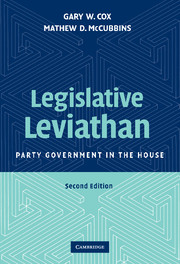Book contents
- Frontmatter
- Contents
- List of Figures
- List of Tables
- Acknowledgments
- Legislative Leviathan
- Introduction
- PART ONE THE AUTONOMY AND DISTINCTIVENESS OF COMMITTEES
- PART TWO A THEORY OF ORGANIZATION
- PART THREE PARTIES AS FLOOR-VOTING COALITIONS
- 6 On the Decline of Party Voting in Congress
- PART FOUR PARTIES AS PROCEDURAL COALITIONS
- PART FIVE PARTIES AS PROCEDURAL COALITIONS
- Conclusion
- Appendix 1 Uncompensated Seniority Violations, Eightieth through Hundredth Congresses
- Appendix 2 A Model of the Speaker's Scheduling Preferences
- Appendix 3 Unchallengeable and Challengeable Vetoes
- Appendix 4 The Scheduling Power
- Bibliography
- Author Index
- Subject Index
6 - On the Decline of Party Voting in Congress
Published online by Cambridge University Press: 05 June 2012
- Frontmatter
- Contents
- List of Figures
- List of Tables
- Acknowledgments
- Legislative Leviathan
- Introduction
- PART ONE THE AUTONOMY AND DISTINCTIVENESS OF COMMITTEES
- PART TWO A THEORY OF ORGANIZATION
- PART THREE PARTIES AS FLOOR-VOTING COALITIONS
- 6 On the Decline of Party Voting in Congress
- PART FOUR PARTIES AS PROCEDURAL COALITIONS
- PART FIVE PARTIES AS PROCEDURAL COALITIONS
- Conclusion
- Appendix 1 Uncompensated Seniority Violations, Eightieth through Hundredth Congresses
- Appendix 2 A Model of the Speaker's Scheduling Preferences
- Appendix 3 Unchallengeable and Challengeable Vetoes
- Appendix 4 The Scheduling Power
- Bibliography
- Author Index
- Subject Index
Summary
The literature on recorded votes in Congress is vast (for surveys, see Collie 1984; Thompson and Silbey 1984; Poole 2005). Most of it, including that portion that deals with the postwar House of Representatives, concludes that party is the single best predictor of congressional voting behavior (Turner 1951; Truman 1959; Matthews 1960; Marwell 1967; Turner and Schneier 1970). At the same time, however, those who take a historical view emphasize the declining importance of party voting in Congress during the twentieth century (Cooper, Brady, and Hurley 1977; Brady, Cooper, and Hurley 1979; Collie 1988a; Clubb and Traugott 1977; Collie and Brady 1985). Collie (1984, 8) summarizes research in this vein up to the 1980s as showing “an erratic but overall decline in the levels of both intraparty cohesion and interparty conflict since the turn of the century.”
Our purpose in this chapter is threefold: first, to discuss some recent work dealing with trends in party voting since 1980, a period not included in the literature cited previously; second, to review the methods used and results found in the literature on the pre-1980 period; and third, to provide a new perspective on historical trends in party voting since the New Deal. We argue that this new perspective centers on the activity of party leaders rather than party majorities. Thus, for example, instead of focusing on such standard measures as the number of party votes – roll calls in which a majority of Republicans oppose a majority of Democrats – we look at party leadership votes, defined as roll calls in which the Republican and Democratic leaderships oppose one another.
- Type
- Chapter
- Information
- Legislative LeviathanParty Government in the House, pp. 129 - 148Publisher: Cambridge University PressPrint publication year: 2007



